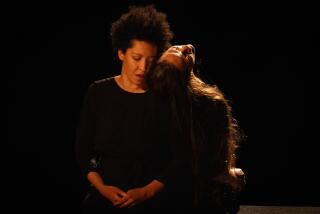Artists and the State of the Art Song
There are few remaining full-time practitioners of the art of the art song. The patience required to master a repertory so heavily dependent on textual comprehension (by audience as well as performers) is hardly compatible with the speeded-up life style of todayâs singers.
Dawn Upshaw would seem to be bucking the trend, to judge by her recent Ambassador Auditorium appearance and a just-released recital of songs by Wolf, Richard Strauss, Rachmaninoff, Ives and Weill (Musicmasters 60128, CD) recorded under the auspices of the Naumburg Foundation.
The young American sopranoâs instrument, light, bright and true, is naturally suited to such soubrette fare as Wolfâs âDie Sprodeâ and âGleich und Gleich.â But even more impressive is the dramatic use to which it is put in the haunting songs of the mad Ophelia (âHamlet,â Act IV) by Richard Strauss, projected with chilling, rapt simplicity. Here, as everywhere in this singularly successful recital, Upshaw, with the powerfully supportive accompaniment of Margo Garett, gives indication of a formidable talent coupled to a formidable interpretive intelligence.
Olav Bar, a 31-year-old East German baritone, is EMIâs current candidate to succeed Dietrich Fischer-Dieskau, Hermann Prey and Gerard Souzay as standard-bearer of the vanishing art of the full-time recitalist. That Bar is a brainy singer and the possessor of an appealingly soft-grained voice (which thins out considerably in the upper reaches) is apparent in his traversal of two dozen of the Hugo Wolf settings of poems by Morike (EMI/Angel 49054). Interpretive caution is, however, more in evidence than the dramatic daring needed to make of each song a small, distinct world. Geoffrey Parsons provides model accompaniments.
Soprano Lucia Popp, who has favored Los Angeles with a pair of memorable recitals in recent years, does possess the rare ability to make each song a complete experience, and she is in superbly secure voice and communicative fettle in her latest Lied recital (Acanta 43510, CD): a ravishing mix of familiar and obscure Brahms and a selection of the young Mahlerâs folksiest creations. Geoffrey Parsons is, again, a pillar of strength and sympathy at the piano.
The male singers who have dominated and sustained the German art song for the past 30-plus years also offer new recordings. Dietrich Fischer-Dieskau, going ever further afield for fresh material, offers (on Orfeo 153 861, CD and LP) rarities by such forgotten German Romantics as Neukomm and Reissiger and by well-known foreigners, e.g., Berlioz and Donizetti. Charming trifles, rendered with immense authority by the 63-year-old baritone, who has wisely chosen songs requiring more in the way of interpretive sensitivity than vocal dexterity. His colleagues are pianist Hartmut Holl, clarinetist Dieter Klocker and hornist Klaus Wallendorf.
Hermann Prey, at 58, shows his current, stunningly healthy vocal estate (a few labored top notes, which he refuses to fake, notwithstanding) in music that makes no concessions to age: Schumannâs Opus 39 âLiederkreisâ and the songs to poems of Justinus Kerner (Denon 1518, CD). Leonard Hokanson is the deft accompanist.
Although the original pitches of Schubertâs âWinterreiseâ need not be compromised thereby, the cycle is rendered dramatically nonsensical when sung by a woman, even as skilled an interpreter as the veteran Christa Ludwig. Her singing is labored and uncharacteristically inexpressive throughout, with no assistance whatsoever from the hard-driven, insensitive accompaniment of pianist James Levine (Deutsche Grammophon 423 366, CD).
Compare this to--no, thereâs really no need, rather simply acquire the 1959 Hermann Prey âWinterreise,â with pianist Karl Engel (Angel/EMI Studio 69106, midpriced CD), a youthfully defiant, thrillingly full-throated interpretation to join the classic, bleakly defeatist view of the same music by Hans Hotter and Gerald Moore, also on mid-priced Angel.
Other recent reissues not to be missed: Soprano Irmgard Seefried toward the end of her career in 1968 but still strong and secure in a recital of largely familiar Schubert songs, with pianist Erik Werba (Ades 13227, CD); Gerard Souzayâs vital, gorgeously sung 1964 recording of Schubertâs âSchone Mullerinâ with pianist Dalton Baldwin the brilliant accompanist (one of Philipsâ mid-priced Legendary Classics CDs, 420 850); and, contrastingly, the subdued, analytical artistry of tenor Peter Schreier, with pianist Walter Olbertz, in a handsome 1976 program of Beethoven songs, among the first in Teldecâs Colour line of mid-priced CD reissues (8.44061).
More to Read
The biggest entertainment stories
Get our big stories about Hollywood, film, television, music, arts, culture and more right in your inbox as soon as they publish.
You may occasionally receive promotional content from the Los Angeles Times.










